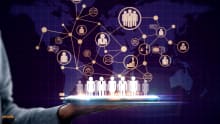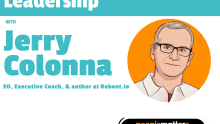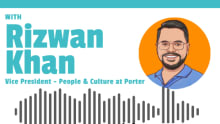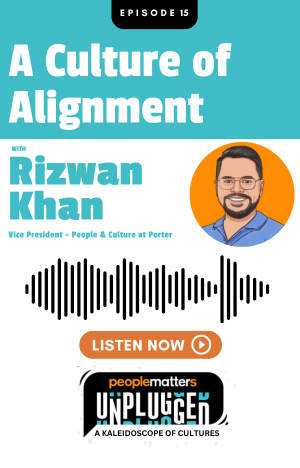Driving workplace wellbeing with tech and data: Wise's Isabel Naidoo on avoiding the downsides

Isabel Naidoo joined Wise as Chief People Officer in 2022, coming from 14 years of experience leading talent strategy across consulting and financial services. A keen speaker and blogger on technology, disruption, inclusion and the workplace, some of her favourite areas of expertise include data and analytics, DEI, and the future of work.
During one of her visits to Singapore, People Matters caught up with Isabel to get her thoughts on wellbeing, especially given the context of aging societies, increasing medical costs, and growing concerns about health – physical, mental, social, and financial – in the workplace. Here's what we heard from her.
Key takeaways:
- Use tech to collect data, and data to analyse your strategies
- Have a spectrum of solutions for a spectrum of needs
- Find a challenge and solve it; build capabilities from there
- Keep the propensity to learn and iterate
What do you think is the greatest wellbeing challenge organisations face today?
The always-on culture and the knock on impact that can have on people's lives. We have to be very mindful of how we can enable people to plan for their work, to take breaks, and to schedule holidays, so that we can avoid building up increasing layers of burnout and stress.
Unfortunately, I don't think technology has helped in this respect. Tech can be a great enabler because it allows you to flex your time and work in a hybrid way, which I think does help wellbeing. But it can also be really detrimental to people's health if they don't have the ability to switch off. People need to be empowered to do things like not having Slack on your phone, or disabling notifications, or respecting weekends and holidays. These sound like small things, but so many company cultures don't do them.
It's interesting you mention that, because tech is touted as the solution to wellbeing. What's the middle ground?
In HR, you can only use tech to solve a problem if you're very careful about how you're asking people to use the technology. And for me one of the greatest leverage points that technology gives you is data. What do you know about your employees, and how do you use that knowledge to pinpoint solutions?
As an example, we survey our employees on a regular basis to find out how they're doing. That survey data lets us get very specific details about their perception of how the company is looking after them. And then you can use tech to analyse that dataset and see that some generations feel differently than others about the support they're getting, some teams or geographies or locations face different challenges, some people in caregiving relationships have specific needs. This level of detail is very important with wellbeing, because what you perceive as your employer's good will and what I perceive might be wildly different.
With the proliferation of tech today, what do you think works to maintain a clear distinction between tech for tech's sake and actually using tech to analyse the situation?
As technology evolves, it's going to become increasingly embedded in the way we do things. And the challenge for HR and our people strategy is how to use tech to create customised experiences at scale. I have 5,500 people to look after, and technology can be a great mechanism for doing that.
Now, we're a tech company, and we're statistically more likely to have people who are willing and ready to embrace technology. It won't be the same in every company or every industry, but from a Wise perspective, this is a very tech enabled organisation. Our employees are always very willing to try new things. They love new innovations.
For any other organisation, I think my advice would be to use tech to get as much data as you can about your employees, because that data enables you to direct your strategies. For example, if you are working on social wellbeing, and you put your whole budget into ways of helping people come together, and you find that this is hugely important to 20% of your population – then you also find that you're not doing anything for the other 80%. That's where you use tech to get that knowledge of what your situation is, so that you can compare it with what you are doing and the outcome you are trying to achieve.
Any tips for getting started with the use of data?
Very simply put, find a challenge to solve for. Rather than thinking “I've got all this data, therefore I'm going to do XYZ”, think “What challenge do I want to solve for?”
For example, if you want to open a new market in Thailand, you could start by using data from LinkedIn to map the talent there; you can find numbers around what types of professionals you have, what skill sets you have, what other data points you need to pull together to start to inform your decision making. And once you've proved the model of using data to solve for a challenge, you can start to build the capabilities that you're missing, or you can build out the datasets that will help you make better decisions in the future.
I always say to my own people team that we need analytics professionals, and we need HR professionals who understand analytics. That means you need to understand data, and you need to be a data analyst who can use insights to inform decision making.
So ask yourself: who's got the capability? And what data do we already have? And then what specific challenge do we solve for?
In today's disrupted world, which areas of culture and wellbeing do you think we ought to focus on the most?
Let me just get my crystal ball out! I think customised solutions is the answer as far as the direct approach goes. But more broadly, there is so much going on in today's world. It's volatile, uncertain, it's complex and ambiguous. And in the midst of all this volatility, the world lurching from one crisis to another, the economic pressures that people have, I actually think that the biggest thing that an organisation and individuals can do is to think about their propensity to learn, and their propensity to iterate.
If we stay still, if we don't learn from the data that we're collecting, if we don't learn from the experiences that we're garnering, then we'll never be able to navigate all these changes.
Whereas if we're willing to iterate our approach to the way we're doing things – so if we roll something out and it doesn't work, we're prepared to change it – that will already increase our ability to be successful.
Because the world isn't going to slow down. The crises aren't going to go away. It might not be the same iteration this year as it was last year. And if you stay still while the world is changing around you, then you soon are going to become defunct. right. So I do think this ability and propensity to learn, to iterate, to constantly evolve, is both an individual thing that you can harness and also a cultural attribute that you can build across companies.














